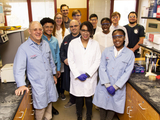~excerpt~
Research team led by UMBC’s Mark Marten studies how fungal cells respond to stress, repair broken cell walls
SCIENCE & TECHNOLOGY | SEPTEMBER 30, 2020 8:44 AM | MEGAN HANKS
Mark Marten, professor and chair of chemical, biochemical, and environmental engineering, is collaborating with researchers at the University of Connecticut and the University of Manitoba to study how fungal cells respond to stress and repair their cell walls. Marten and his collaborators identified three coordinated pathways involved in the response to cell wall stress in filamentous fungi.
Numerous species of filamentous fungi are pathogens that can make people sick, especially people who are immunocompromised. Different species of fungi play an important role in the development of pharmaceuticals and enzymes, and agriculture, where fungi can help improve the quality of soil and make nutrients more readily available for crops, explains Marten. By understanding how cells work and respond to stress, researchers can reverse-engineer processes that could have a broad range of applications.
Understanding how cells respond to stress
Marten and his collaborators Ranjan Srivastava, University of Connecticut, and Steven Harris, University of Manitoba, recently received over $1.2 million in grant funding from the National Science Foundation (NSF) to further explore how filamentous fungi repair their cell walls when exposed to stressors. This work will build upon previous NSF-supported research completed by the team. Molecular and Cellular Proteomics has just published their findings on critical cellular processes triggered when cells respond to environmental stress. Cynthia Chelius, Ph.D. ‘19, chemical engineering, is the first author on the paper.
Posted: September 30, 2020, 12:41 PM
